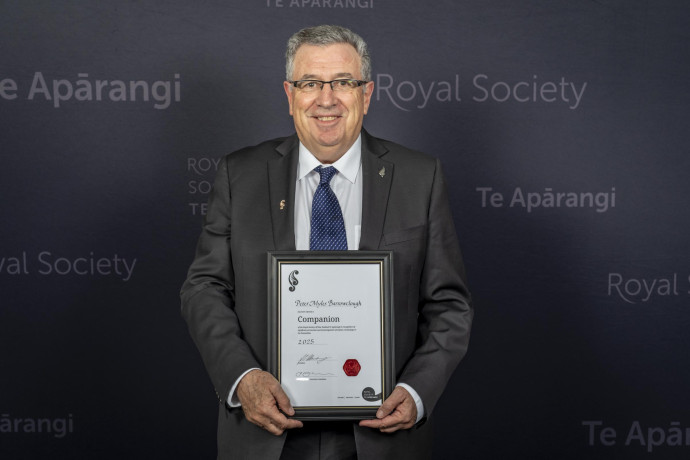News
Published 9 October 2025A bridge between agritech and the commercial world

Peter Barrowclough CRSNZ has been elected as a Companion of the Royal Society Te Apārangi for fostering collaboration and commercialisation within New Zealand’s agricultural technology sector.
As the Chief Executive of Lincoln Agritech Ltd from 2009 to 2023, Peter transformed the company. Under his leadership, Lincoln Agritech grew from 35 to 85 staff and its revenue increased from $5.5 million to $15 million.
Peter drove innovation in precision agriculture, environmental sensing, irrigation efficiency, artificial intelligence, groundwater research, new materials, and robotics.
He has overseen commercialisation of multiple technologies during his time at Lincoln Agritech and prior to that at Crop & Food Research, to address critical national issues such as climate change, water quality, and adding value to primary-sector products.
Alongside his executive career, Peter has contributed extensively through governance roles, including at the Precision Agriculture Association, FoodSouth, the Independent Research Association of New Zealand, and the Canterbury Development Corporation, where he contributed to regional economic-development initiatives and earthquake recovery in Christchurch.
"Our scientists and research engineers are world-class. The challenge is ensuring we keep moving science out of the lab and into the hands of users, creating high-value jobs and economic growth, while still caring for our environment" – Peter Barrowclough
Peter grew up on a dairy farm, and his first job was as a field research technician at the Ruakura Research Centre before he went to university to study horticultural science. He picked up marketing papers in his final year because he wanted to position himself “between science and business”.
“This turned out to be a key theme of my career: I have been able to bridge between the science world and the commercial world, translate between them, and turn many scientific discoveries into commercial realities.”
Some of the highlights and challenges of his career have included starting a company when he was just 26 to grow wasabi on the West Coast of the South Island and export it to Japan. “This taught me problem-solving, exporting, and the highs and lows of entrepreneurship.”
Following the tragic air accident in 2003 that claimed the lives of seven Crop & Food Research staff, including most of the management team, Peter returned to the organisation as a general manager from his job setting up a national network of business incubators. “That period taught me resilience, crisis management, and the importance of valuing colleagues as people and friends as well as professionals,” Peter said.
Leading Lincoln Agritech for 14 years was a “rewarding experience and a chance to give back to Lincoln” but also came with challenges from the Christchurch earthquakes, the Covid pandemic, and the mosque shootings.
“International collaborations were very rewarding, including expanding sales of irrigation-design software Irricad TM to more than 90 countries and establishing distribution for it in China,” he said.
“Another highlight was a project on adding value to coarse wool in conjunction with WRONZ, which I believe could rival the economic impact of innovations such as gold kiwifruit and ryegrass endophytes in New Zealand."
“Along the way I worked with many brilliant scientists and engineers. I particularly enjoyed working alongside them to turn their discoveries into solutions that people could use to address real-world problems.”
Peter says New Zealand has a major opportunity to export technology globally, in agritech and beyond, as well as apply it here.
“Our scientists and research engineers are world-class. The challenge is ensuring we keep moving science out of the lab and into the hands of users, creating high-value jobs and economic growth, while still caring for our environment.”
